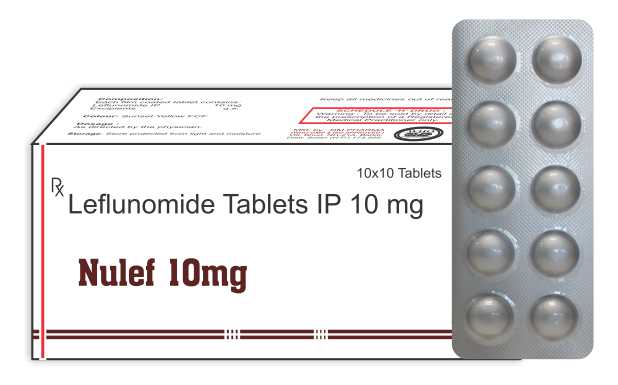About Composition:
Leflunomide is an immunomodulatory agent used in the therapy of rheumatoid arthritis and psoriatic arthritis.
Leflunomide is an isoxazole derivative that is rapidly converted to its active metabolite teriflunomide in the gut wall and liver. Leflunomide acts by inhibition of dihydroorotate dehydrogenase, which is a rate limiting step in pyrimidine synthesis necessary for DNA replication of rapidly dividing cells. Activated Tlymphocytes are particularly sensitive to the inhibition of pyrimidine synthesis caused by leflunomide.
Leflunomide blocks the formation of deoxyribonucleic acid (also known as DNA), which is important for developing cells, such as those in the immune system. It suppresses your immune system to reduce inflammation that causes pain and swelling in rheumatoid arthritis.
This drug works by selectively interfering with the ability of white blood cells called lymphocytes to produce the disease response that ultimately leads to pain, inflammation and joint damage.
Rheumatoid arthritis (RA) is thought to be an autoimmune disease. The immune system normally makes antibodies (small proteins) to attack bacteria, viruses, and other germs. In people with autoimmune diseases, the immune system makes antibodies against tissues of the body. In people with RA, antibodies are formed against the tissues that surround the joints. This causes inflammation, pain, and swelling around the affected joints. Over time, it causes damage. Medicines called disease-modifying antirheumatic drugs (DMARDs) are prescribed to suppress the inflammation.
Symptoms of rheumatoid arthritis include inflammation of joints, swelling, difficulty moving and pain. Other symptoms that affect the entire body include loss of appetite, fever, loss of energy and anaemia (lack of red blood cells).
Psoriatic arthritis is a particular type of arthritis that develops in some people who also have a skin condition called psoriasis.
Symptoms of active psoriatic arthritis include inflammation of joints, swelling, difficulty moving, pain and patches of red, scaly skin (skin lesions).
Therapeutic Indication:
Used to treat adult patients with active rheumatoid arthritis or with active psoriatic arthritis.
Leflunomide helps to slow down the process of joint damage and to relieve the symptoms of the disease, such as joint tenderness, swelling, pain and morning stiffness.
Pharmacology:
Mechanism of Action:
Leflunomide reduces inflammation in the joints that is responsible for both the symptoms of rheumatoid arthritis and the destruction of joints. This reduces symptoms as well as the progressive deformities of the joints caused by the arthritis. Leflunomide reduces inflammation by suppressing the activity of immune cells responsible for the inflammation. Leflunomide suppresses immune cells by inhibiting dihydroorotate dehydrogenase, an enzyme that is necessary for the production of DNA and RNA. Without DNA and RNA the immune cells (and most other types of cells) cannot multiply or function (or exist). Because of its unique and different mechanism of action, leflunomide is of value when added to other medications used for treating rheumatoid arthritis.
Pharmacokinetics:
Absorption: Bioavailability: Approx 82-95%. Time to peak plasma concentration (active metabolite): 6- 12 hr.
Distribution: Volume of distribution: 0.13 L/kg. Plasma protein binding (active metabolite): 99% (mainly albumin).
Metabolism: Rapidly converted to active metabolite A77 1726 in GI mucosa and the liver.
Excretion: Via urine (approx 43% as glucuronides) and faeces (approx 48%). Elimination half-life (active metabolite): Approx 14-18 days.
Pregnancy and Lactation:
Not recommended.
Contraindications:
Leflunomide is contraindicated in patients with patients with severe hepatic impairment and also patients with known hypersensitivity to Leflunomide or any of the other components of Leflunomide tablets. Known reactions include anaphylaxis.
Warning & Precaution:
This has been prescribed for the patient's specific condition only.
Side Effects:
Loss of appetite, diarrhoea, nausea, vomiting, abdominal pain, mild allergic reactions, tiredness (asthenia), problems in the nerves of the arms or legs, anxiety, taste disturbances, increased hair loss,.
Storage:
Store protected from light and moisture.
